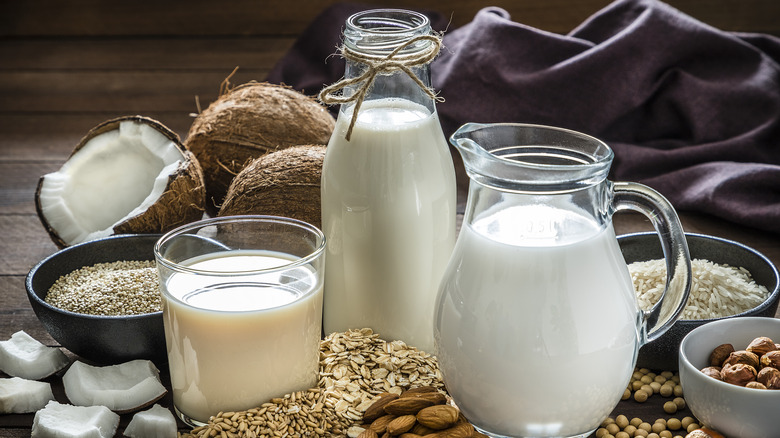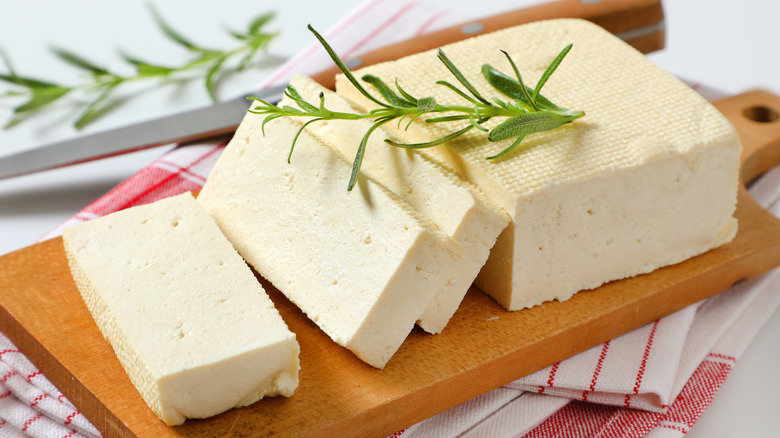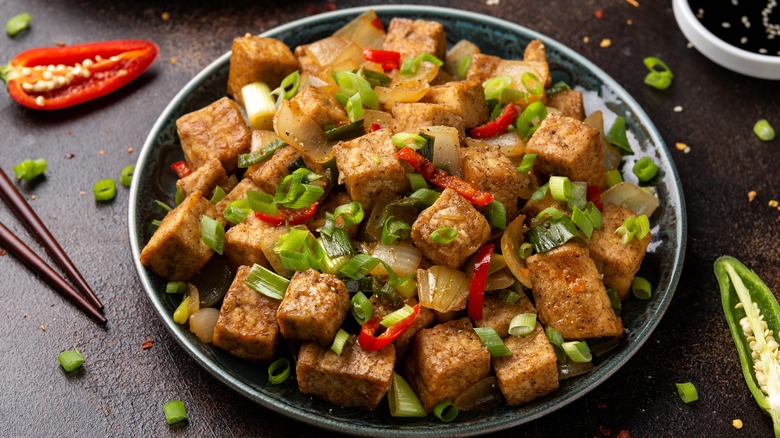The Unexpected Food That Has More Calcium Than Milk
Cow's milk has long been considered one of the best sources of calcium, but that's no longer the case. Fortified orange juice, sesame seeds, almonds, dried figs, canned sardines, and some tofu products all contain more calcium than milk. For example, canned sardines provide 340 milligrams of this mineral per serving (1/2 can), which is about half of the recommended daily intake. By comparison, skim milk boasts 260 milligrams of calcium per glass.
As it turns out, firm tofu is just as good as or even better than cow's milk, from a nutritional standpoint. Manufacturers use either calcium sulfate or magnesium chloride to coagulate soy milk, with the former being the most common. Unlike other salt coagulants, calcium sulfate preserves the taste of soybeans and brings out their distinct flavor. Additionally, tofu is high in protein and has little or no saturated fat. What's even more impressive is its calcium content, which exceeds that of most foods, including milk.
Firm tofu is higher in calcium and protein than milk
A calcium-rich diet will keep your bones healthy and strong, but not all calcium sources are created equal. For example, 1 ounce of grated parmesan boasts 26% of the recommended daily calcium intake, but it also contains large amounts of fat, cholesterol, and sodium. Milk is a better option, but it may cause issues for those with lactose intolerance. On top of that, researchers found that high milk intakes promote oxidative stress, increasing the risk of fractures and premature death, according to 2014 evidence published in The BMJ.
A safer alternative is soy and its derivatives, including tofu. A half-cup of firm tofu prepared with calcium sulfate delivers 860 milligrams of calcium, or 66% of the recommended daily intake. You'll also get 22 grams of protein, 3 grams of fiber, and high doses of iron, phosphorus, copper, zinc, and other minerals. A glass of skim milk has only 16 grams of protein, 597 milligrams of calcium, and no fiber. Plus, it's significantly higher in sodium and simple carbs than firm tofu.
It's also worth mentioning that we absorb about one-third of the calcium in dairy foods, according to the Harvard T.H. Chan School of Public Health. The calcium in tofu has a similar absorption rate to that of milk, reports a 2006 study in the Journal of Food Science. But because tofu is higher in calcium than milk, it gives you more nutritional bang for your buck.
Simple, delicious ways to add tofu to your diet
Firm tofu is quite bland, but its neutral flavor makes it ideal for a wide range of meals and snacks. It's a perfect addition to vegan sandwiches, tacos, fried rice, soups, meatless chili, and pasta dishes. For example, you can make coconut tofu in the air fryer and enjoy it as a snack between meals. This ingredient also goes well with mashed potatoes, tacos, scrambled eggs, stir-fries, or cauliflower rice. Plus, you can coat it with sesame seeds or crushed almonds and bake this mixture to make tofu nuggets.
Another option is to pair tofu with mussels and serve it in a sweet smoked paprika sauce for a hearty lunch or dinner. Firm tofu can also replace cheese in most recipes. Use it as is or marinate it in a mixture of olive oils and herbs, and then sprinkle it over pizza, stir it into omelets, or mix it into salads. If you're craving Chinese food, cut a block of tofu into small pieces and bake it until crispy. Coat it in a sauce made with garlic, sriracha, soy sauce, and ginger.
You can also use firm tofu as a meat substitute in most recipes. For example, this creamy green bean and tofu vegan casserole tastes so good that you'd never guess it's meatless. On a similar note, you can swap chicken for tofu in noodle soups, stews, or burgers to boost your calcium intake.


